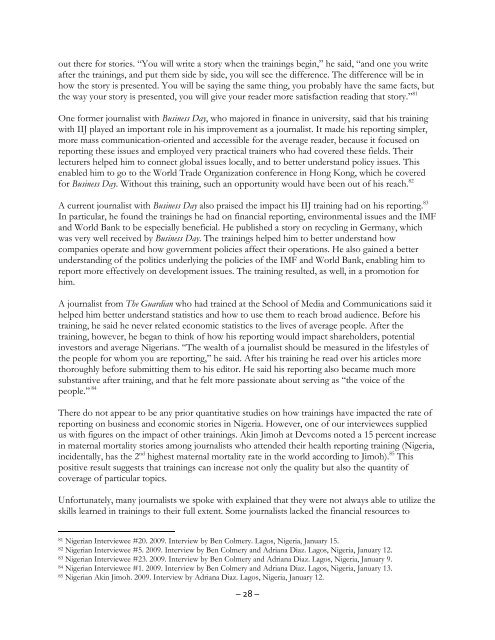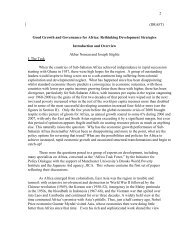out there <strong>for</strong> stories. “You will write a story when the trainings begin,” he said, “and one you writeafter the trainings, and put them side by side, you will see the difference. The difference will be inhow the story is presented. You will be saying the same thing, you probably have the same facts, butthe way your story is presented, you will give your reader more satisfaction reading that story.” 81One <strong>for</strong>mer journalist with Business Day, who majored in finance in university, said that his trainingwith IIJ played an important role in his improvement as a journalist. It made his reporting simpler,more mass communication-oriented and accessible <strong>for</strong> the average reader, because it focused onreporting these issues and employed very practical trainers who had covered these fields. Theirlecturers helped him to connect global issues locally, and to better understand policy issues. Thisenabled him to go to the World Trade Organization conference in Hong Kong, which he covered<strong>for</strong> Business Day. Without this training, such an opportunity would have been out of his reach. 82A current journalist with Business Day also praised the impact his IIJ training had on his reporting. 83In particular, he found the trainings he had on financial reporting, environmental issues and the IMFand World Bank to be especially beneficial. He published a story on recycling in Germany, whichwas very well received by Business Day. The trainings helped him to better understand howcompanies operate and how government policies affect their operations. He also gained a betterunderstanding of the politics underlying the policies of the IMF and World Bank, enabling him toreport more effectively on development issues. The training resulted, as well, in a promotion <strong>for</strong>him.A journalist from The Guardian who had trained at the School of Media and Communications said ithelped him better understand statistics and how to use them to reach broad audience. Be<strong>for</strong>e histraining, he said he never related economic statistics to the lives of average people. After thetraining, however, he began to think of how his reporting would impact shareholders, potentialinvestors and average Nigerians. “The wealth of a journalist should be measured in the lifestyles ofthe people <strong>for</strong> whom you are reporting,” he said. After his training he read over his articles morethoroughly be<strong>for</strong>e submitting them to his editor. He said his reporting also became much moresubstantive after training, and that he felt more passionate about serving as “the voice of thepeople.” 84There do not appear to be any prior quantitative studies on how trainings have impacted the rate ofreporting on business and economic stories in Nigeria. However, one of our interviewees suppliedus with figures on the impact of other trainings. Akin Jimoh at Devcoms noted a 15 percent increasein maternal mortality stories among journalists who attended their health reporting training (Nigeria,incidentally, has the 2 nd highest maternal mortality rate in the world according to Jimoh). 85 Thispositive result suggests that trainings can increase not only the quality but also the quantity ofcoverage of particular topics.Un<strong>for</strong>tunately, many journalists we spoke with explained that they were not always able to utilize theskills learned in trainings to their full extent. Some journalists lacked the financial resources to81 Nigerian Interviewee #20. 2009. Interview by Ben Colmery. Lagos, Nigeria, January 15.82 Nigerian Interviewee #5. 2009. Interview by Ben Colmery and Adriana Diaz. Lagos, Nigeria, January 12.83 Nigerian Interviewee #23. 2009. Interview by Ben Colmery and Adriana Diaz. Lagos, Nigeria, January 9.84 Nigerian Interviewee #1. 2009. Interview by Ben Colmery and Adriana Diaz. Lagos, Nigeria, January 13.85 Nigerian Akin Jimoh. 2009. Interview by Adriana Diaz. Lagos, Nigeria, January 12.– 28 –
completely make use of some of the new skills they had learned. Joke Kujenya, a journalist with TheNation, said that she bought a digital recorder in the U.S. during a training trip and was disheartenedthat her coworkers back at The Nation were so excited by it. She thinks such commonplacejournalistic tools “shouldn’t be a big deal.” In other cases, journalists returned to their officesfeeling that their editors – who had not been on trainings with them – did not grasp the fullimportance of their new approach to reporting. Kirk Robertson Leigh, a freelance journalist, reportsthat through training he “picked up the concept of – so what? – a very important concept. Iremember having an argument with my editor here on how you report. I was becoming an apostleof the ‘so what?’, but it’s lacking here. You know, when I ask why don’t you guys do it this way theirreply is, we’ve always been doing it this way.”There was some sentiment among journalists, however, that this is changing. A <strong>for</strong>mer journalistfrom This Day contended that the market demand <strong>for</strong> good stories is growing steadily. “If journalistsare trained better, and they churn out good stories” he said, “it will be a function of demand andsupply. The market demands <strong>for</strong> these stories. The publishers will be <strong>for</strong>ced to publish thesestories.” 86 A journalist from Punch backed up this sentiment when he said, “Obviously they willpublish it, and be ready to see the consequences. I can assure you that if something is good, if it istruthful, Punch will publish it. It is not owned by a politician. If something is truthful and everyoneelse rejects it, Punch will publish it and damn the consequences. This paper and some others arewilling to go to any lengths to publish the truth. There are not many, but they are there.” 87Impact on Pay and BenefitsLow remuneration is a major cause of flight from the profession and one reason why journalistsoften take bribes from their sources. Also, because of their low pay, “Most journalists are not able toresist the temptation of bribery or corruption,” said a journalist with Punch. “If I am earning $1000here, then I am earning $2000 in America, and others are earning one quarter of that in some of theplaces here. That is why some journalists are not even ready to listen to something that is upright,they want to survive. But I believe with a good pay and good condition of services, journalists willstand up and fight. There are newspapers here that have not paid their journalists <strong>for</strong> four months.”88A stringer <strong>for</strong> the New York Times said that the average monthly wage <strong>for</strong> an editor is N200K(~$1300) to N300K (~$2000) a month, which he said is equivalent to entry-level pay <strong>for</strong> a bank.“Sometimes what you have not earned in the last twenty years [as a journalist] you get to earn in justa few months [at a bank].” 89It is important to evaluate whether or not trainings will increase pay and benefits <strong>for</strong> journalists inNigeria. In our survey, we found that 61.5 percent of respondents reported receiving increased payafter training. When asked to explain the connection between training and pay increases, thecommon response was that trainings themselves didn’t automatically result in higher pay, but that astheir reporting improved from training, their editors took notice and often their pay level was raisedas a result. Some journalists reported that their pay increased relatively soon after their trainings. Ajournalist with Business Day said he believed his pay increases have been a “reward <strong>for</strong> my workprobably, as a result of applying what I learnt in the course of my training to the work.” 90 As86 Nigerian Interviewee #20. 2009. Interview by Ben Colmery. Lagos, Nigeria, January 15.87 Nigerian Interviewee #4. 2009. Interview by Ben Colmery. Lagos, Nigeria, January 13.88 Nigerian Interviewee #4. 2009. Interview by Ben Colmery. Lagos, Nigeria, January 13.89 Nigerian Interviewee #24. 2009. Interview by Ben Colmery. Lagos, Nigeria, January 16.90 Nigerian Interviewee #22. 2009. Interview by Ben Colmery. Lagos, Nigeria, January 9.– 29 –
- Page 1 and 2: THEREWILLBE INKA study of journalis
- Page 3 and 4: AcknowledgementsThis paper has bene
- Page 7 and 8: Executive SummaryPurpose of the Rep
- Page 9 and 10: journalists in these countries that
- Page 11 and 12: Existing International Training Opp
- Page 13 and 14: • Consumer Affairs and Informatio
- Page 15 and 16: Background 3Of the three countries
- Page 17 and 18: pervasive conflict in the Niger Del
- Page 19 and 20: 3) Crises or disruptions, where som
- Page 21 and 22: Low pay and low regardOne of the mo
- Page 23 and 24: Even in cases where working journal
- Page 25 and 26: But while some reporters think FOIB
- Page 27 and 28: When asked how much the media could
- Page 29 and 30: the effects of these challenges for
- Page 31 and 32: detailed analysis of the opportunit
- Page 33: journalist said he has, however,
- Page 37 and 38: money. Their knowledge of what medi
- Page 39 and 40: Notes on conducting research in Nig
- Page 41 and 42: Ghana- 35 -
- Page 43 and 44: evenues each year,” 106 which wou
- Page 45 and 46: entertainment news, scandals, and p
- Page 47 and 48: The rise of business-focused journa
- Page 49 and 50: coverage of the oil industry is als
- Page 51 and 52: needed supplementary income to cash
- Page 53 and 54: as supporting one political party o
- Page 55 and 56: Numerous journalists recounted how
- Page 57 and 58: Training programs available to busi
- Page 59 and 60: Amos Safo, editor-in-chief at the p
- Page 61 and 62: Notes on conducting research in Gha
- Page 63 and 64: Background 136Literacy and Educatio
- Page 65 and 66: “sufficient information” about
- Page 67 and 68: or criminal charges for content the
- Page 69 and 70: have such difficulty obtaining info
- Page 71 and 72: The majority of those interviewed b
- Page 73 and 74: commitment to their profession and
- Page 75 and 76: Notes on Conducting Research in Uga
- Page 77 and 78: Recommendations for Revenue Watch I
- Page 79 and 80: people who have no journalism backg
- Page 81 and 82: analyzes business,” he said, “e
- Page 83 and 84: A journalist with The Punch said,
- Page 85 and 86:
The Media Foundation for West Afric
- Page 87 and 88:
Length of TrainingRoughly three-qua
- Page 89 and 90:
industries, for instance, ought to
- Page 91 and 92:
otherwise being published in the pr
- Page 93 and 94:
Non-Training Recommendations for Ug
- Page 95 and 96:
Appendix A: NigeriaPotential Partne
- Page 97 and 98:
journalists. Biakolo is very profes
- Page 99 and 100:
Television Stations• Nigerian Tel
- Page 101 and 102:
have two to four month professional
- Page 103 and 104:
City: AccraTelephone: +233 (021) 22
- Page 105 and 106:
Fax: +256 414 255 495E-mail: umdf@a
- Page 107 and 108:
• What do you think are the most
- Page 109 and 110:
Appendix E: Survey Questions1. Name
- Page 111 and 112:
18. How effective were the teaching
- Page 113 and 114:
28. What are the most important cha
- Page 115 and 116:
1. Journalists by Country2. How wou
- Page 117 and 118:
5. How often do you travel out of t
- Page 119 and 120:
9. Which organization(s) sponsored
- Page 121:
12. After completing the training(s














